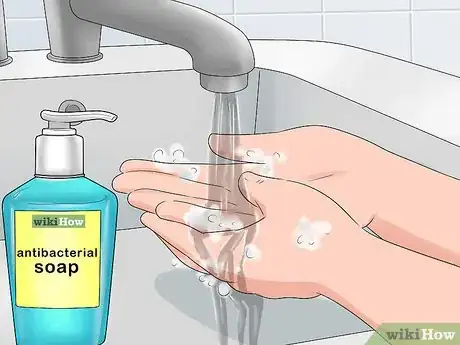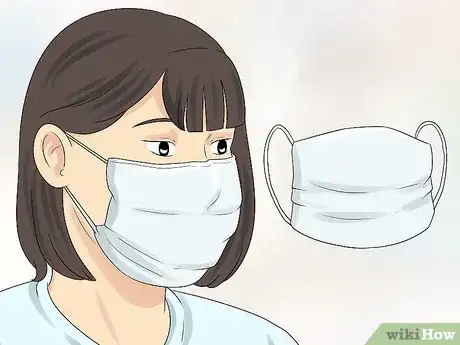This article was medically reviewed by Luba Lee, FNP-BC, MS. Luba Lee, FNP-BC is a Board-Certified Family Nurse Practitioner (FNP) and educator in Tennessee with over a decade of clinical experience. Luba has certifications in Pediatric Advanced Life Support (PALS), Emergency Medicine, Advanced Cardiac Life Support (ACLS), Team Building, and Critical Care Nursing. She received her Master of Science in Nursing (MSN) from the University of Tennessee in 2006.
There are 11 references cited in this article, which can be found at the bottom of the page.
wikiHow marks an article as reader-approved once it receives enough positive feedback. In this case, 80% of readers who voted found the article helpful, earning it our reader-approved status.
This article has been viewed 196,896 times.
Neutrophils are a type of white blood cell that helps your body fight infection. You may develop low levels of neutrophils, called neutropenia, if you have cancer or are undergoing treatment for cancer, such as chemotherapy. You can also develop neutropenia due to a poor diet, a blood-related disease, or a bone marrow infection. To raise neutrophils in your body, you can adjust your diet and use medical treatments to address the issue. You should also take steps to stay healthy and avoid germs or bacteria, as you will be more susceptible to catching an infection or illness when your neutrophil levels are low.[1]
Steps
Adjusting Your Diet
-
1Eat fruits and vegetables high in vitamin C. This vitamin is a great way to boost your immune system and ensure your neutrophil levels do not fall too low. Have fresh fruits like oranges, bananas, apples, and pears. Go for fresh vegetables like broccoli, carrots, peppers, kale, and spinach. Add them to your meals to keep your neutrophil levels up.[2]
-
2Add foods rich in vitamin E and zinc. Vitamin E is essential for stimulating the production of white blood cells, and zinc is important for increasing neutrophils. Both nutrients are readily available in food.[3]Advertisement
-
3Have foods high in omega-3 fatty acids. Foods like salmon, mackerel, and flax oil are all high in omega-3 fatty acids. Fatty acids increase your levels of phagocytes, which are white blood cells that consume bad bacteria in your body. Add these foods to your diet and cook with flax oil, or have 1⁄2 teaspoon (2.5 ml) of flax oil once a day.[6]
-
4Go for foods high in vitamin B-12. You can develop neutropenia if you are deficient in vitamin B-12. Having foods high in this vitamin like fish, eggs, milk, and leafy greens can help to boost your neutrophil levels.[7]
- Certain soy products are enriched with vitamin B-12, a good option if you are vegan or do not like eating animal products.
- You can also take vitamin B-12 supplements to ensure you are getting enough of this vitamin in your diet.
-
5Avoid raw meat, fish, or eggs. These foods, eaten raw, can put you at risk of exposure to bacteria and germs. Make sure you eat these foods cooked to a safe internal temperature.[8]
-
6Use nutritional supplements after talking to your doctor. If your diet is poor or you have a poor appetite, you may want to take a multivitamin or supplements to help your body in making white blood cells. However, always talk to your doctor or healthcare provider before taking any vitamins or supplements.
- Make sure that your doctor or healthcare provider considers all medications you are taking when advising you about supplementation.
-
7Wash and prepare all foods properly. Use warm running water to wash all fresh fruits and vegetables you eat, as this will reduce your exposure to bacteria and germs. Prepare food by cooking it to a safe internal temperature and refrigerate or freeze any leftovers within 2 hours. Do not use wooden cutting boards or sponges, as they can attract germs.[9]
- Safe food handling and preparation can help to reduce your risk of exposure to germs or bacteria that can make you sick due to your low neutrophil levels.
Getting Medical Treatment
-
1Ask your doctor for a prescription for neutrophil-boosting medication. Medication like Neupogen can help to raise your neutrophil levels, especially if you are undergoing treatment for cancer. Your doctor can give you this medication with an injection or through an IV. You may receive it daily if your neutrophil levels are very low and you are undergoing chemotherapy.[10]
- You may experience side effects like nausea, fever, bone pain, and back pain while on this medication.
-
2Ask your doctor if other conditions are affecting your neutrophil levels. Neutropenia can be caused by other conditions like a bacterial infection or a virus. Your doctor may treat these issues by hospitalizing you and giving you antibiotics to treat the underlying infection. Once the infection clears up, your neutrophil levels should return to normal.[11]
-
3Get a bone marrow transplant if your condition becomes severe. If your low neutrophil levels are due to a disease like leukemia or aplastic anemia, your doctor may suggest a bone marrow transplant. The transplant is done by removing diseased bone marrow and replacing it with healthy bone marrow from a donor. You will be under general anesthesia during the procedure.[12]
- You may need to take medication before and after you have the bone marrow transplant to ensure the infection is gone and your neutrophil levels are back to normal.
Staying Healthy with Low Neutrophils
-
1Wash your hands regularly with warm water and antibacterial soap. Proper hand washing can go a long way to prevent exposure to infections and germs, especially if your immune system and neutrophil levels are low. Scrub your hands with soap and water for 15-30 seconds. Then, rinse them well under warm, running water and dry your hands well with a paper towel.[13]
- Make sure you wash your hand before eating, drinking or taking medicine, and after using the bathroom. Wash your hands before touching food or any parts of your body, especially your eyes, nose, and mouth.
- Always wash your hands after touching pets or animals.
-
2Wear a face mask to prevent exposure to germs and bacteria. Protect your mouth and nose by wearing a face mask when you go outside or to public places, especially anywhere with large crowds. You can also wear a face mask at home if you live with others or your living space is dusty, moldy, or dirty.[14]
- You can buy face masks at your local medical supply store or online.
-
3Stay away from others who have the flu or a cold. Do not spend time with others who are sick or ill, as this can expose you to germs. Ask people who have the flu or cold to keep their distance until your neutrophil levels return to normal.[15]
- You may also avoid going to areas or spaces that are crowded, such as malls, where there may be people who are sick or ill.
-
4Maintain good oral hygiene to prevent infection. Brush and floss your teeth 2-3 times a day as well as every time you eat. Try rinsing your mouth with water and baking soda to remove germs or bacteria. Rinse your toothbrush regularly under warm, running water to keep it clean.[16]
References
- ↑ https://patient.info/doctor/neutropenic-patients-and-neutropenic-regimes
- ↑ https://www.pcrm.org/news/blog/foods-boost-immune-system
- ↑ https://www.pcrm.org/news/blog/foods-boost-immune-system
- ↑ https://www.hsph.harvard.edu/nutritionsource/food-sources-of-vitamin-e/
- ↑ https://ods.od.nih.gov/factsheets/Zinc-HealthProfessional/
- ↑ https://www.ncbi.nlm.nih.gov/pmc/articles/PMC6834330/
- ↑ https://healthfully.com/low-white-blood-cell-counts-4844278.html
- ↑ https://www.foodsafety.gov/food-safety-charts/safe-minimum-cooking-temperature
- ↑ https://www.cdc.gov/foodsafety/communication/food-safety-in-the-kitchen.html
- ↑ http://chemocare.com/chemotherapy/drug-info/Neupogen.aspx
- ↑ http://www.seattlechildrens.org/medical-conditions/heart-blood-conditions/neutropenia/
- ↑ http://www.seattlechildrens.org/medical-conditions/heart-blood-conditions/neutropenia/
- ↑ https://healthguides.healthgrades.com/article/6-sanitary-measures-for-staying-healthy-with-neutropenia
- ↑ https://healthguides.healthgrades.com/article/6-sanitary-measures-for-staying-healthy-with-neutropenia
- ↑ https://healthguides.healthgrades.com/article/6-sanitary-measures-for-staying-healthy-with-neutropenia
- ↑ https://healthguides.healthgrades.com/article/6-sanitary-measures-for-staying-healthy-with-neutropenia
About This Article
To raise your neutrophils, which are a type of white blood cell that helps your body fight infection, adjust your diet. Eat more fruits and vegetables that are high in vitamin C, like oranges, bananas, pears, broccoli, carrots, peppers, and spinach. You’ll also want to increase your vitamin E and zinc intake, which you can find in almonds, avocados, beans, and whole grains. Since a vitamin B deficiency can lead to neutropenia, eat eggs, milk, and leafy greens or take a supplement to keep your levels up. If your neutrophils are low because of cancer treatment, talk to your doctor about getting a prescription for neutrophil-boosting medication. For more tips from our Medical co-author, including how to stay healthy with low neutrophils, keep reading!





















-Step-14-Version-2.webp)






















































Medical Disclaimer
The content of this article is not intended to be a substitute for professional medical advice, examination, diagnosis, or treatment. You should always contact your doctor or other qualified healthcare professional before starting, changing, or stopping any kind of health treatment.
Read More...